The Latvians have participated in Olympic ice hockey first in 1936 and then, after gaining their independence from the Soviet Union in 1991, again in 2002, with a best finish of 9th, 2006 and 2010. They failed to qualify for the Games in both 1994 and 1998.
Prior to 1940, Latvia competed in the World Championships in 1933, 1935, 1938 and 1939. Since regaining their independence, Latvia has been a regular participant in the World Championships, first being assigned to Pool C as a new country, the lowest rung of the ladder system. Right off the bat, the Lativans won Pool C, earning promotion to Pool B. Following a pair of second place finishes in 1994 and 1995, they won Pool B in 1996, earning promotion to the Top Division for 1997, where they have remained since, recording a best finish of 7th on three occasions and averaging a 10th place finish, generally avoiding the relegation round. Whenever they have faced with competing in the relegation round, they have survived easily.
Perhaps the finest moment in Latvian hockey history came with the 3-2 defeat of Russia at the 2000 World Championships held in Saint Petersburg, Russia, which had great emotional significance for the Latvians given their past political history with the Russians.
If that moment does not rank as the top moment, then the amazing comeback in the final game of Final Olympic Qualifying for the 2006 Olympics in Torino, Italy ranks surely must be. With both Latvia and Belarus off to 2-0 records, they were to meet in the final winner-take-all game of their group.
Belarus opened the scoring of the deciding game at 5:16 of the first and stretched their lead to two at 12:06 before Latvia answered at 18:33. The second period was played even, with each team scoring one with Belarus going back up by two at 1:49 before former Boston Bruin Grigori Panteleev scored 18 seconds later to return the margin to one in favor of Belarus.
Belarus put themselves in a good position with a goal at 9:11 of the third to make the score 4-2 for Belarus.
Now in desperation mode, Latvia pulled goalie Edgars Masalskis during a Latvian powerplay at the with just six minutes remaining in the game and down by two. The gamble paid off as Latvia scored at the 15:11 mark to reduce the margin again to one.
1:47 later the Latvians thrilled the home crowd by getting the equalizer at even strength, leaving just three minutes to decide who would claim the final remaining spot in the Olympics. Alexsandrs Semjonovs sent the home fans into rapture by finishing the comeback and punching Latvia's ticket to Italy just 33 seconds later to complete the three goal outburst in two minutes and twenty seconds in what would become known as "The Miracle in Riga".
Another notable moment for Latvia was a 3-3 tie against the United States during the 2006 Olympics in Torino, Italy.
Latvia enters the 2014 Olympics as a team having gone through a transition, with just a single active NHLer on it's roster, the young Zamgus Girgensons of the Buffalo Sabres. While the Latvians do have NHL veteran and 42 year old Sandis Ozolinsh on the team, they are past their glory days of battling Switzerland for the "best of the rest" in the early 2000's when they boasted players such as Arturs Irbe, Sergei Zholtok and Ozolinsh on a regular basis. They will also be sadly missing NHL veteran Karlis Skrastins, who was killed in the Lokomotiv Yaroslavl air disaster.
Sandis Ozolinsh
Still, for followers of international hockey, there are several veteran players on the Latvian roster and they are not to be taken lightly. Outside the lone NHLer Girgensons on their roster, the remainder of the Latvian roster draws heavily from Dinamo Riga of the Kontinental Hockey Legaue (KHL), with 8 members of that club on the roster, which will hopefully give the Latvians a cohesiveness and familiarity with each other right from the start that most countries will be only hoping to find. Of the remaining players, five more come from other clubs in the KHL, two from Switzerland and one each from leagues in Kazakhstan, the Czech Republic, Slovakia, Germany and one in playing college hockey in the United States.
With the format for this year's Olympics calling for the top four teams after the Preliminary Round to receive byes into the quarterfinals, the key for Latvia will be gaining as many points as possible against what appears to be the toughest group in the competition, which contains Sweden (ranked 1st), the Czech Republic (4th) and Switzerland (7th).
The absolute best case scenario for Latvia would include beating or tying Switzerland and hoping for a tie against the Czech Republic. Realistically however, Latvia will be trying to keep their games as low scoring and close as possible playing a tight defense in order to give themselves the most favorable goal differential compared to the other lower ranked teams. Doing so would earn them the most favorable matchup on February 18th in the Qualification Playoffs to determine who will advance to the quarterfinals should Latvia go winless in their Group of Death.
Today's featured jersey is a 2000 Latvia National Team Arturs Irbe jersey as worn during the 2000 World Championships when Latvia defeated Russia in an emotional 3-2 in Russia.
Irbe was a regular member of the Lativa National Team whenever his NHL commitments would allow, and he competed in nine World Championships and two Olympic Games for Latvia following their gaining their independence from the Soviet Union, with whom he also competed in two additional World Championships, winning gold medals in both 1989 and 1990.
Here is a look at the jerseys that Latvia will be wearing in the 2014 Olympics in Sochi. The Latvians will be wearing jerseys with a classic look with minimal striping, unlike some of the more unusual designs that will be appearing in Sochi. The use of the Latvian Coat of Arms as the main crest creates a striking jersey made unique with Lativa's maroon coloring.
Today's video highlights begin with the stunning comeback by Latvia in the last four minutes of the deciding game of the Final Olympic Qualifying for the 2006 Olympics that would become known as "The Miracle in Riga".


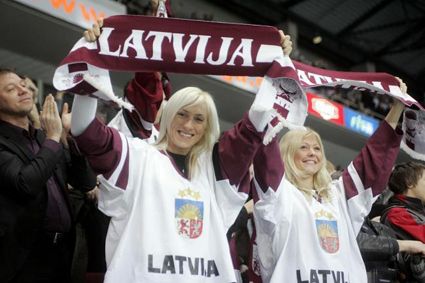
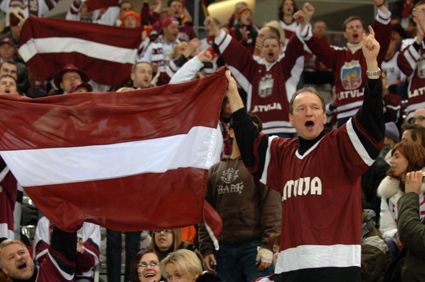
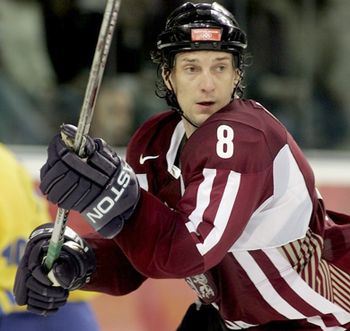
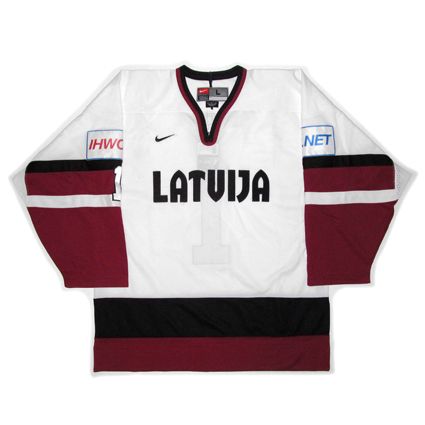
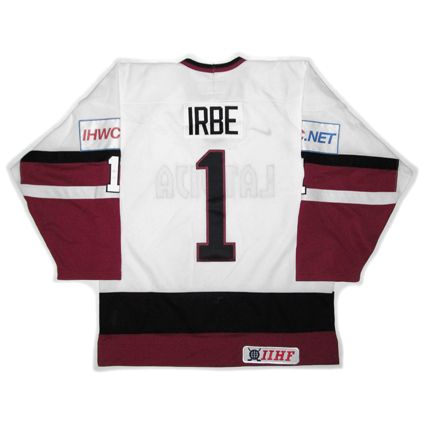











No comments:
Post a Comment
We welcome and encourage genuine comments and corrections from our readers. Please no spam. It will not be approved and never seen.